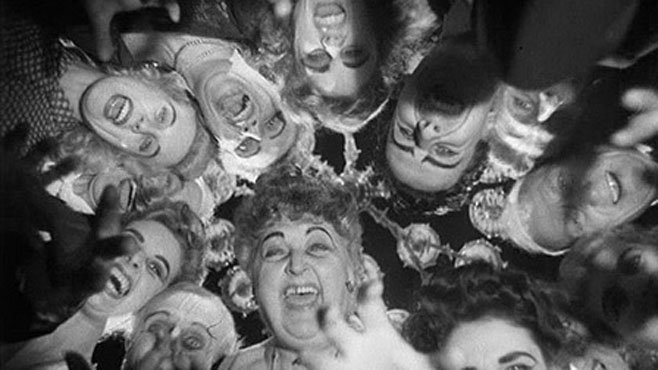
Dead Of Night (1945)
“Well, how’s the great debunker going to debunk that?”
Yer Millennials and Gen Zeds will have you believe that they invented slow-burn, “elevated horror”. But being a bunch of e-scooter-riding, attention deficient ketamine addicts who refuse to watch a screen bigger than a pocket calculator, what do they know? They’ve clearly never chanced on Dead Of Night during a late night showing on Channel Four, as I did during my formative years. Because if they had, they’d know that as well as giving us Spitfires, Vera Lynn, the defeat of facism (ha) and Al Bowlly (anything else? I’m struggling here), the 1940s also served up Dead Of Night.
It's an outlier, a crisp black-and-white fever dream. A recurring nightmare of sickly terror, that gets under your skin and refuses to let go. In a word, it has a certain special something which sets it apart from others of its ilk.
Why? No idea. Perhaps it gains its power from the time it was made. Perhaps the sunny settings, jolly framing device and faces familiar from more gentle films of the time help amplify the spookiness. Whatever the reason, every positive review you’ve read regarding this film is right. Dead Of Night is the benchmark. It’s the ideal. It’s the film so many others made since wanted to be, but didn’t quite make it.
And imagine yourself as architect Walter Craig (Mervyn Johns), the chap we follow into a picture-postcard countryside cottage, knowing he has been there before in a recurring nightmare he has. His upbringing says he has no choice but to honour his invitation. Despite knowing there will be a “nightmare of horror” before he sets foot outside again. Things don’t get much more British than that.
Although, in fact, they do – because the assorted chaps and chapesses gathered inside won’t believe a word of it, and are queueing up to:
A. Tell him what an arse he is for believing in any kind of supernatural twaddle, and
B. Perversely give him a terrifying example of when such supernatural twaddle had a profound effect on their own lives.
That combination of absolute certainty in their own thoughts and beliefs whilst being blind to the realities of their own lives… that’s what things don’t get more British than. So forget what I said earlier.
Craig is bursting with information about what he knows is going to happen, but they talk themselves out of believing him – whilst at the same time wishing it might be true. As Mrs Foley (Mary Merrall) says on being told forcefully that Craig’s story is nonsense: “Well, I must say it's very disappointing not to be one of the leading characters in a sort of supernatural drama after all!”
And lo, the stories begin. Told, in order, by a racing car driver, a precocious child, a middle-class couple, a golfer, and a psychiatrist. All dressed in tweed and waving away clouds of cigarette smoke. And you don’t get more British than that. Apart from the psychiatrist, obviously, who is, as all psychiatrists must be, even in 1940s Britain, German.
If you haven’t already seen this film, nothing you read here is going to convince you that it is truly that great. For example, in the first story we’re treated to a moment when, in dead silence, a man lying in a hospital bed realises something is wrong. He goes to open his curtains and finds that it’s not the middle of the night as he expected, but it’s broad daylight outside. Nothing there to elicit a chill, you might think. But you’re dead wrong.
The double-whammy this sets you up for involving a repeated line (“Just room for one inside sir”), is tremendous, and it feels like somehow the makers have chanced on a way of inducing a real primal fear in the viewer, that lasts for the rest of the film.
But hey, we’re getting a bit serious here. Let us not forget we’re here to have a laugh. So it’s time for a Christmas party and game of sardines, in a house famed for an ancient murder (“that’s where the whole thing happened!”). Then we’re off for a birthday surprise present of a shit old mirror, which seems to have a fault in it. And on with a bit of light relief (told to cheer everyone up) about a romantic triangle leading to suicide and ghostly goings-on on a golf course. Starring the Ant and Dec of the 1940s, Basil Radford and Naunton Wayne ("Just because a chap becomes a ghost, it surely doesn't mean he ceases to be a gentleman!"). Finally arriving at everyone’s favourite live entertainment – ventriloquism. Complete with the most terrifying dummy yet put on film. And the astonishing Michael Redgrave.
All very innocent-sounding when written down, wouldn’t you say? Well, each story does get debunked by our resident psychiatrist, Doctor Albury (Robert Wyndham). And they are all presented as being potentially the products of wild imaginations and/or serious mental problems. So, nothing much to worry about at all. After all, Hugh Grainger (Anthony Baird) had just suffered a major bump on the noggin, courtesy of his car crash. Sally (Sally-Anne Howes) is possibly just trying to ingratiate herself with the adults. Perhaps Peter Cortland (Ralph Michael) had simply got fed up with being married to Googie Withers with her rubbish presents, and decided to do her in (and she was being strangled when she saw something in the mirror… lack of oxygen to the old brainbox?). And we’re not entirely sure that dummy every actually moved by itself. Are… we?
Yes, there’s something primal about Dead Of Night. Something that gnaws away at you, long after the credits roll. And while we’re on the subject of the end credits, why is it that those final scenes, already seen, give you such chills?
